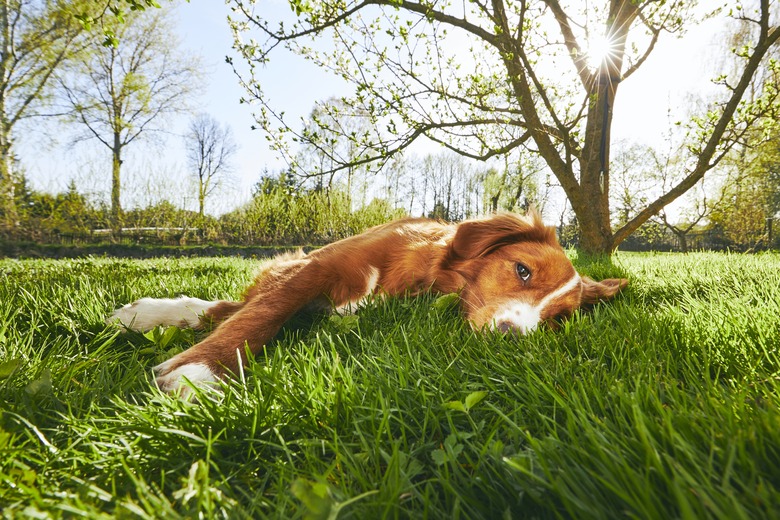What Are The Symptoms A Dog Would Get If She Ate Weed Killer?
Many people use herbicides on lawns and gardens because they are effective at controlling unwanted weeds. But weed killer and dogs can be a bad mix, because they can have unintended side effects for people who have pets. They have the potential to be toxic to your dog if ingested. Gastrointestinal upset, seizures and breathing problems and other signs of being poisoned are possible. Careful application and cleanup helps reduce the likelihood of accidental poisoning. Know the signs of weed killer poisoning, and act quickly to improve your dog's odds of recovery.
How herbicide poisoning happens
How herbicide poisoning happens
When used as directed, herbicides don't usually pose a risk to dogs, especially when animals are kept away for at least an hour after spraying. Poisoning usually happens when weeds are oversprayed or when dogs come in contact with weed killer before it dries.
Dogs can ingest weed killer if they chew on a container of the stuff. In some instances, dogs can be slowly poisoned over time due to herbicide run-off that gets integrated into a water source. Careful storage of all lawn chemicals is vital to ensuring your dog's safety.
Dogs eat grass for a variety of reasons. Sometimes a dog eating grass sprayed with RoundUp herbicide can result in poisoning because the dog is eating grass as they normally do and don't realize that it's been sprayed. If you do plan to spray your yard, or you think your neighbors might be spraying, keep your dog indoors. If you're using a public park such as a school or other dog park, take notice to see if there is a posted schedule of spraying that takes place there.
Mother Nature Network suggests that your pup can develop signs of poisoning just from coming in contact with toxic lawn chemicals through her skin or by licking her fur or feet after walking through sprayed areas. Over the long term, dogs that experience weed killer poisoning may be more susceptible to reproductive issues and some forms of cancer.
Symptoms of weed killer poisoning
Symptoms of weed killer poisoning
If your dog ingests toxic weed killer, she could experience symptoms including vomiting, muscle weakness, lethargy, diarrhea, convulsions and respiratory problems. She may find it hard to stand or walk. You might notice inflammation or chemical burns on her mouth, nose and tongue.
Dangerous herbicides for dogs
Dangerous herbicides for dogs
Since weed killer and pets can be a dangerous combination, read the labels on all weed killers you plan to use and look for brands that are pet-safe. The Merck Veterinary Manual says to avoid products that contain certain ingredients including sodium arsenite, arsenic trioxide, sodium chlorate, ammonium sulfamate, borax, and many others. These are more toxic to animals than some other options. Always follow the application directions, whether the produce says it is pet safe or not.
Some ingredients that may be nontoxic on their own can be dangerous in combination with others. According to the Merck Veterinary Manual, beware of atrazine, buturon, butiphos, chloridazon, chlorpropham, cynazine, 2,4-D and 2,4,5-T alone or in combination, dichlorprop dinoseb, dinoterb, linuron, mecoprop, monolinuron, MCPA (2-methyl-4-chlorophenoxyacetic acid), prometryn, propachlor, nitrofen, silvex, TCDD and tridiphane. Lawn fertilizer, plant food and mulch can be toxic to your dog if eaten. If you employ a commercial landscaper to work in your yard, ask about the type of chemicals used and whether they are pet-safe.
Call poison control
Call poison control
It may take hours or days for the effects of herbicide toxicity to set in, so if you think your dog ate weed killer, seek medical attention as soon as you notice symptoms. If you suspect weed killer poisoning, contact your veterinarian or call the ASPCA's animal poison control hotline at 888-426-4435. They currently charge a $65 consultation fee.
Do not induce vomiting unless directed to by a veterinary professional or poison control specialist. In the future, carefully label and store all lawn and garden chemicals, including those used to eradicate insects and rodents, and follow the directions for safe application.
Always check with your veterinarian before changing your pet's diet, medication, or physical activity routines. This information is not a substitute for a vet's opinion.
